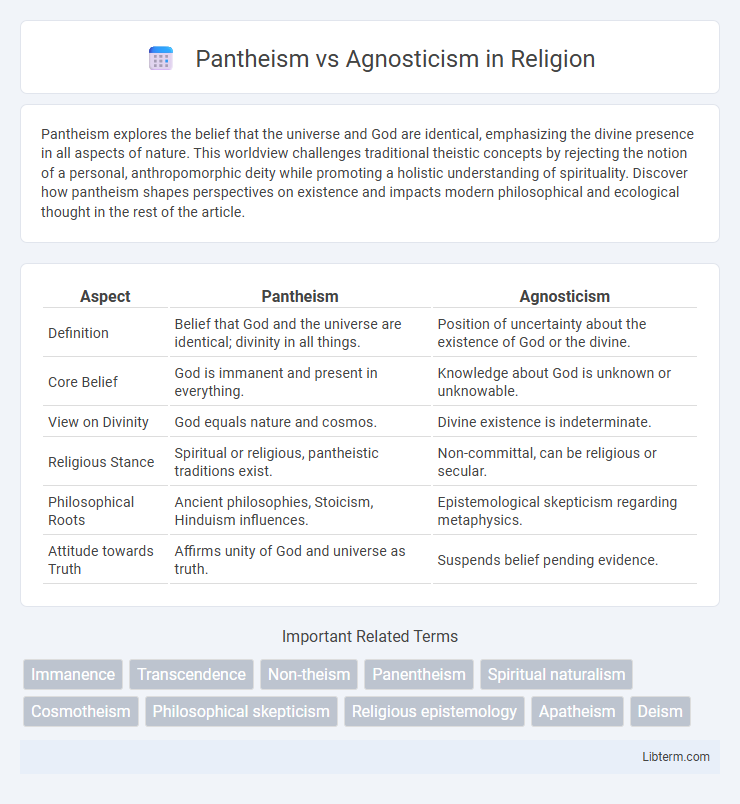Pantheism explores the belief that the universe and God are identical, emphasizing the divine presence in all aspects of nature. This worldview challenges traditional theistic concepts by rejecting the notion of a personal, anthropomorphic deity while promoting a holistic understanding of spirituality. Discover how pantheism shapes perspectives on existence and impacts modern philosophical and ecological thought in the rest of the article.
Table of Comparison
| Aspect | Pantheism | Agnosticism |
|---|---|---|
| Definition | Belief that God and the universe are identical; divinity in all things. | Position of uncertainty about the existence of God or the divine. |
| Core Belief | God is immanent and present in everything. | Knowledge about God is unknown or unknowable. |
| View on Divinity | God equals nature and cosmos. | Divine existence is indeterminate. |
| Religious Stance | Spiritual or religious, pantheistic traditions exist. | Non-committal, can be religious or secular. |
| Philosophical Roots | Ancient philosophies, Stoicism, Hinduism influences. | Epistemological skepticism regarding metaphysics. |
| Attitude towards Truth | Affirms unity of God and universe as truth. | Suspends belief pending evidence. |
Introduction to Pantheism and Agnosticism
Pantheism identifies divinity with the universe, asserting that everything collectively embodies the divine, emphasizing an interconnected and immanent God. Agnosticism maintains a position of uncertainty about the existence of any deity, highlighting the limitations of human knowledge in discerning spiritual truths. These contrasting perspectives shape diverse approaches to spirituality, encompassing certainty of divine presence versus epistemic humility regarding religious claims.
Core Beliefs of Pantheism
Pantheism asserts that the universe and God are identical, embracing the belief that divinity is immanent in all aspects of nature and existence. It denies a personal, anthropomorphic deity, viewing God as an all-encompassing, unifying presence within the cosmos. This worldview emphasizes interconnectedness, spirituality in natural phenomena, and reverence for the universe as a manifestation of the divine essence.
Fundamental Principles of Agnosticism
Agnosticism centers on the principle that the existence of deities or the divine is unknown or unknowable, emphasizing a position of epistemological uncertainty rather than theological assertion. Unlike pantheism, which equates God with the universe and asserts a divine presence in all things, agnosticism refrains from making definite claims about the existence or nature of any deity. This fundamental principle makes agnosticism a stance rooted in skepticism and inquiry, often prioritizing evidence and rational investigation over faith or dogma.
Historical Origins and Key Figures
Pantheism, rooted in ancient Greek philosophy with figures like Heraclitus and later Baruch Spinoza, identifies God with the universe, emphasizing an all-encompassing divine presence in nature. Agnosticism emerged in the 19th century, coined by Thomas Huxley, advocating skepticism about the knowability of God's existence, navigating between theism and atheism. Both perspectives shaped religious and philosophical discourse by challenging traditional conceptions of divinity and knowledge.
Comparison of Worldviews
Pantheism asserts that divinity permeates the entire universe, identifying God with nature and reality itself, whereas agnosticism maintains a position of uncertainty or skepticism regarding the existence of any deity. Pantheism embraces a spiritual perspective that sees the cosmos as intrinsically sacred, while agnosticism emphasizes epistemological humility, refraining from definitive claims about divine knowledge. This fundamental divergence influences ethical, metaphysical, and existential interpretations within both worldviews.
Attitudes toward God and Divinity
Pantheism identifies God with the universe, viewing divinity as an immanent, all-encompassing presence within nature and existence itself. Agnosticism maintains a position of uncertainty or skepticism regarding the existence or nature of God, emphasizing the limits of human knowledge about divine matters. While pantheism embraces a defined spiritual worldview, agnosticism refrains from affirming or denying any metaphysical claims about God or divinity.
Pantheism vs Agnosticism on Science and Nature
Pantheism views the universe and nature as a divine manifestation, embracing an intrinsic spiritual connection to all natural phenomena without invoking a personal deity. Agnosticism maintains a position of uncertainty regarding the existence of deities, emphasizing empirical inquiry and skepticism, which aligns closely with scientific methodologies that prioritize evidence and testability. While Pantheism integrates a spiritual interpretation of nature, Agnosticism supports a neutral stance, often fostering an open-ended exploration of scientific understanding without spiritual assumptions.
Ethical Implications in Both Belief Systems
Pantheism promotes an ethical framework grounded in the unity and sacredness of all existence, encouraging environmental stewardship and compassion towards all living beings. Agnosticism, characterized by epistemological humility regarding the existence of deities, often leads to ethical systems based on secular humanism and rational inquiry, emphasizing personal responsibility and moral reasoning without reliance on divine authority. Both belief systems influence ethical behavior by fostering respect for life and encouraging individuals to derive moral values either from the interconnectedness of the universe or from empirical and philosophical reflection.
Influence on Spirituality and Daily Life
Pantheism shapes spirituality by promoting a deep reverence for the universe as a unified divine entity, fostering practices centered on nature and interconnectedness. Agnosticism influences daily life through a focus on inquiry and skepticism, encouraging individuals to live with intellectual humility and openness toward spiritual questions without definitive beliefs. Both perspectives impact personal ethics and worldview by balancing certainty and mystery in understanding existence and morality.
Conclusion: Bridging the Philosophical Divide
Pantheism asserts the divine presence in all aspects of the universe, emphasizing unity and interconnectedness, while agnosticism maintains a position of uncertainty regarding the existence of deities, prioritizing epistemic humility. Bridging this philosophical divide involves recognizing the shared quest for understanding existence, where pantheism's holistic spirituality complements agnosticism's critical inquiry. This synthesis fosters a dialogue that respects both metaphysical belief and intellectual openness, promoting a nuanced appreciation of diverse worldviews.
Pantheism Infographic

 libterm.com
libterm.com